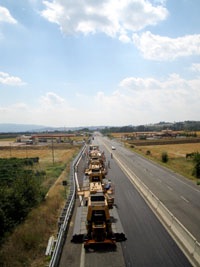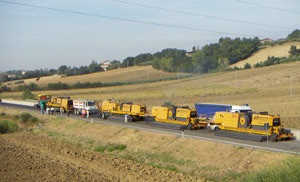Asphalt: Renaissance of the Roads and the Stimulation of a Mature Industry
Human beings are quite accomplished at integrating materials into complex and very useful products such as cars, CDs, and computers, all of which are ultimately destined for the landfill. Using nature as a model, we learn that there is much to be gained from turning our attention towards the separation of these products, back into their useful components, creating a system that generates economic, environmental and social abundance.
In this case study we see the connection between plastics and road maintenance, how innovations in one industry can redefine another seemingly unrelated industry, creating new business models, generating the jobs of the future, and setting considerably higher standards for safety and environment. In this case we will see how Italian and Japanese companies are "paving the way" for innovation.
We often assume that science and technology will secure the continuous improvement of productivity and quality, all at decreasing expense. While noble in theory, current business practices demonstrate that we rarely maintain this never-ending path of improvements, and even resist fundamental breakthroughs due to carefully protected investments and comfortable profit margins.
ZERI demonstrates that if a business operates within its sector, it is likely to drift towards mature industries with few - if any - fundamental innovations providing new benefits to the market and better returns to the shareholders. If on the other hand, corporations are prepared to loosely organize themselves into clusters of complementary industries, integrating their operations into a system, then innovations in one sector could have a fundamental impact on another totally unrelated industry.
Consider the road building and maintenance industry; most roads around the world today are constructed with an asphalt cover (a mixture of waste from the petroleum industry and small rocks). While previously considered a "cheap" solution, the cost of asphalt does not reflect the hidden societal costs in terms of safety and environmental concerns. Asphalt is not porous which generates aquaplaning, a main cause of fatal road injuries. The environmental impact of asphalt is quite negative due to its energy use in production and placement and to its ultimate transfer to and disposal in landfills.
The machinery to construct and maintain roads is expensive. Because the capital equipment is such a big investment, and since the law prohibits a fast depreciation, the owners of such asset outlays will resist the introduction and the adoption of innovative technologies in an effort to secure their return on existing investments. As a result, the industry has become a mature industry with few innovations, supporting a set of standards for road safety and ecological performance which are below its potential.
At a time when the European Union is preparing for 26,000 km new roads, including 10,000 km in Italy only, it is clear that the building up of this massive infrastructure, in addition to the continued maintenance of the existing network of roads represents a major opportunity for technological innovations. This case study offers insight into how innovations in the future may well be catalyzed by fundamental changes in what would be described as unrelated industries. The present management standard to adhere strictly to core business based on core competences is questioned. The interesting observation is that this change will be made possible thanks to a new technology introduced in the plastics industry, which is totally unrelated to the road building and maintenance sector itself.
The combination of plastics with other materials is clearly a breakthrough, adding functionality to many applications, with many more sure to be invented. There is one factor that is largely neglected; these multilayered materials are potentially a serious pollutant and even quite toxic when combined. An industry that figured out how to integrate these components into plastics now turns its attention towards the separation of the components back into the original materials.
A group of Latin American scientists has succeeded in identifying active ingredients which result in the quick and simple separation of paper, plastics, ferrous and non-ferrous metal layers. The process is simple, fast and cost-effective.
Though separating materials is only part of the solution; once separated one needs to find commercially viable uses for the components. In light of the growth of energy saving packaging for food (which is always multilayered), and in light of the explosive growth in CDs and DVDs, the availability of both the aluminum and the polycarbonates is guaranteed for a couple decades to come. It is the separation of plastics from aluminum, glass, and paper that offers a unique opportunity for improving environmental performance while rendering the road industry effective. By crossing into an unrelated industry, we can create a porous asphalt out of the polycarbonates extracted from the plastics!
Several engineering companies succeeded in rethinking the present model and concluded that it must be possible to scrape the asphalt off the road, recondition it right there and use it once more on the spot as a road cover. This recycling on-site represents a major breakthrough. It eliminates the need to landfill, the need for new asphalt, the need for transportation of both the old and the new asphalt, thus reducing cost and traffic jams. This same approach can be adapted to apply the porous asphalt created from separated plastics.
First and foremost the capital equipment needed to perform this task is about three times costlier than the existing investment layout for covering the road with asphalt. It can be proven that this additional cost is recovered within the first year mainly thanks to the elimination of the landfill fees, the faster turnaround of the work, the lower inconveniences on the road due to shorter work time and much reduced truck traffic around the site. Now the challenge is to push the technology forward from concept to prototype, from prototype to a new industrial standard. This endeavor has so many obstacles that it is best for the leading nations in the process to join forces in order to succeed. Since Japan and Italy are the only two countries that have promoted and even mandated the use of porous asphalt, it is logical that both nations will also pioneer the development of the recycling equipment and the research on the adaptation of the system to porous asphalt.
If countries follow the leadership provided by the Italian and Japanese road authorities, which is likely given the triple results (safety, cost and ecology), then a new business model emerges. In the process, we will be creating an industry that is truly in tune with the needs of society, merging the need for road infrastructure with the need for safety and ecological concerns. We will also see the wisdom in crossing boundaries between industries, fostering creativity, innovation and leadership.

BOOK GUNTER PAULI FOR A CONFERENCE




